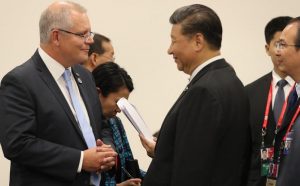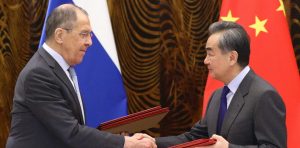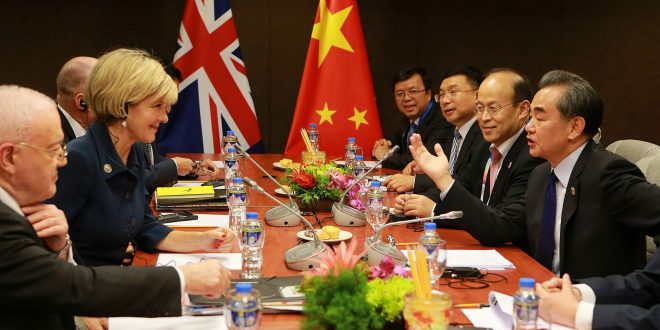01-06-2021
Bureau Report + Agencies
CANBERRA/ WELLINGTON: The leaders of New Zealand and Australia have presented a united front on China, expressing deep concern over Beijing’s actions in Hong Kong and Xinjiang while pushing for a continued investigation into the origins of the COVID-19 pandemic.
New Zealand’s Prime Minister Jacinda Ardern, who hosted her Australian counterpart, Scott Morrison, for talks on Monday, strongly refuted suggestions of differences in the two countries’ approach towards China.
 “You’ll see Australia and New Zealand have broadly been positioned in exactly the same place on these issues consistently,” she said at a joint press conference in Queenstown. “So, I really push back on any suggestion that we are not taking a strong stance on these incredibly important issues.”
“You’ll see Australia and New Zealand have broadly been positioned in exactly the same place on these issues consistently,” she said at a joint press conference in Queenstown. “So, I really push back on any suggestion that we are not taking a strong stance on these incredibly important issues.”
The show of unity came amid escalating tensions between Australia and China, with Beijing blocking some Australian exports after Canberra excluded China’s telecom giant Huawei from its 5G phone network and called for an independent inquiry into the origins of the novel coronavirus.
Australia has since referred China to the World Trade Organization over its decision to restrict Australian barley.
New Zealand, on the other hand, has opted for a more diplomatic approach by strengthening economic ties with Beijing, including upgrading a free trade agreement this year. This has led to suggestions in the Australian media that Wellington was being too soft on Beijing but Morrison defended New Zealand, saying he and Ardern shared similar philosophies.
“Australia and New Zealand are trading nations,” the Australian leader said. “But neither of us would ever trade our sovereignty or trade our values. We have stood side-by-side to defend and protect and promote these values.”
He warned “there will be those far from here who would seek to divide us,” but said “they will not succeed.”
 Ahead of Morrison’s visit, New Zealand said it would back Australia in the WTO spat.
Ahead of Morrison’s visit, New Zealand said it would back Australia in the WTO spat.
Hong Kong, Xinjiang, coronavirus
The two leaders, in a joint declaration after their talks, expressed “deep concern over developments that limit the rights and freedoms of the people of Hong Kong”, where Beijing has clamped down on dissent by introducing a new security law that criminalizes what it considers subversion, secessionism, terrorism or collusion with foreign forces.
Ardern and Morrison also criticized China’s treatment of the Uighur minority in Xinjiang, calling on Beijing to respect their human rights and grant the United Nations and other independent observers’ unfettered access to the region. Activists and UN rights experts say at least one million Muslims have been detained in camps in Xinjiang. The activists and some Western politicians accuse China of using torture, forced labor and sterilizations. Beijing denies the accusations.
On the World Health Organization’s inquiry into the origins of the pandemic, both leaders told reporters they hoped the global health body’s investigation would continue.
“It’s got nothing to do with global politics,” Morrison said. “This has nothing to do with anything other than ensuring that the global pandemic, which has caused such havoc around the world, stealing lives and livelihoods that we understand how this occurred so we can do everything we possibly can to ensure that it does not happen again.”
 He also said both Australia and New Zealand wanted a free and peaceful Indo-Pacific region and would work to ensure that goal was not threatened by rising tensions between the United States and China.
He also said both Australia and New Zealand wanted a free and peaceful Indo-Pacific region and would work to ensure that goal was not threatened by rising tensions between the United States and China.
“The world is being characterized by increased strategic competition between the US and China, that is a self-evident fact,” he said. “I would say our shared view is that such strategic competition does not need to lead to increased likelihood of conflict.”
Ardern meanwhile said New Zealand remained a committed member of the US-led Five Eyes intelligence-sharing alliance, which also includes Australia, Canada and the United Kingdom.
“That is not in question, not in doubt,” she said.
New Zealand and Australia opened a quarantine-free travel bubble last month, allowing Morrison’s visit to take place. Both leaders said the next logical step in the gradual reopening of their borders would be to expand the bubble to include some other South Pacific island nations.
The two leaders also indicated that Australian citizen Brenton Tarrant, who two years ago slaughtered 51 worshippers at two Christchurch mosques, would continue serving his sentence of life without parole in New Zealand.
Ardern said the guidance on where Tarrant should be imprisoned needed to come from survivors and loved ones, and the informal feedback she’d received from them was in favor of him staying in New Zealand.
“And I understand that,” Ardern said. “There’s something about the proximity in ensuring that the sentence that was handed down is served.”
Morrison said he, too, wanted to respect the wishes of those affected.
 Pressmediaofindia
Pressmediaofindia




